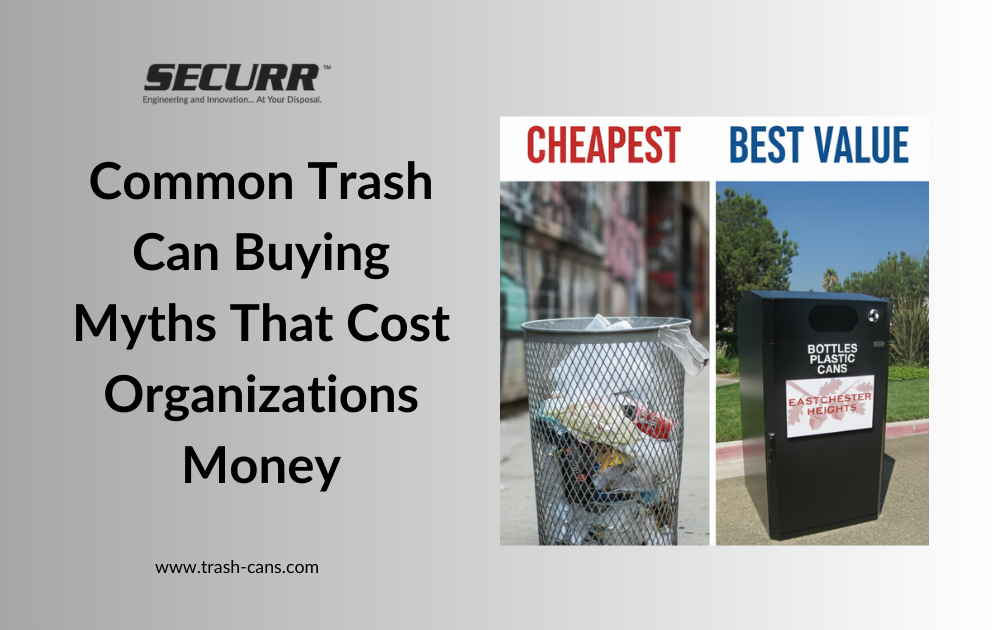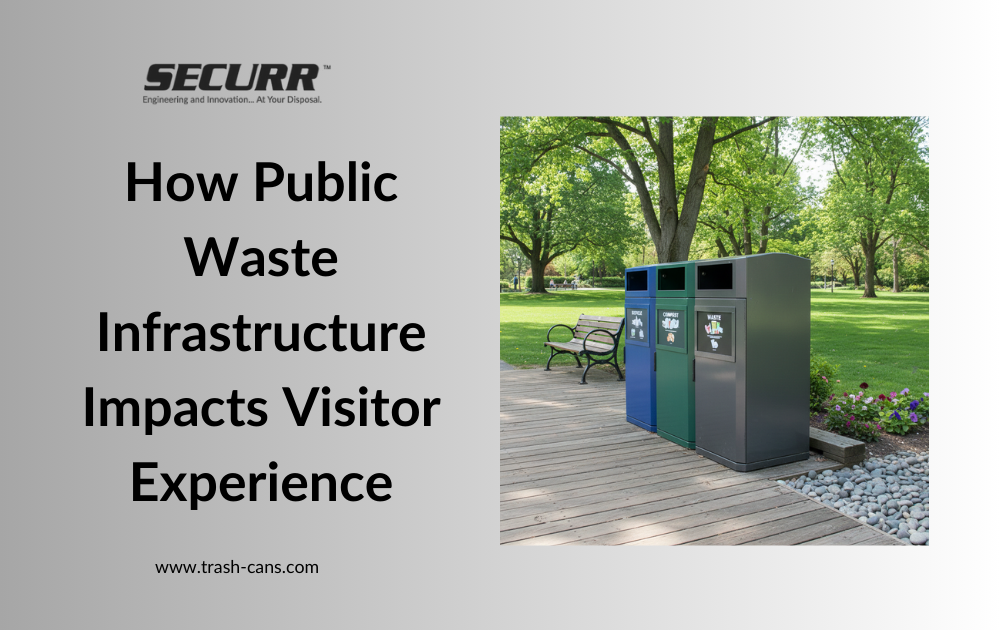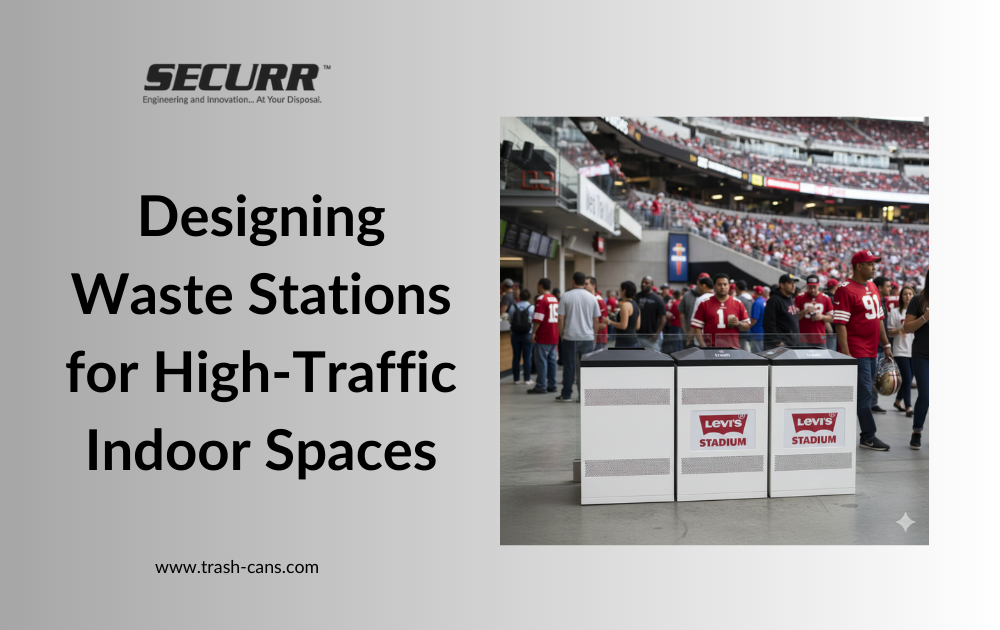News
Common Trash Can Buying Myths That Cost Organizations Money
Posted by Securr Blogger on
When organizations shop for waste solutions, trash cans often seem like a simple, low-risk purchase. In reality, buying the wrong trash cans can quietly drain budgets, create safety issues, and increase long-term operational costs. As a leading trash can manufacturer, Securr works with municipalities, facilities managers, schools, and commercial organizations every day—and we see the same misconceptions repeatedly. Let’s break down the most expensive trash can buying myths and explain how to avoid them. Myth #1: The Cheapest Trash Can Is the Best Value One of the most common mistakes organizations make is prioritizing upfront price over long-term performance. Low-cost trash cans are often made with thin materials that: Crack or warp in extreme weather Corrode quickly in outdoor environments Require frequent replacement What looks like a budget win becomes a recurring expense. The reality:A high-quality trash can from a reputable trash can manufacturer delivers a lower total cost of ownership. Durable construction, weather resistance, and vandal-resistant designs dramatically reduce...
How Public Waste Infrastructure Impacts Visitor Experience
Posted by Securr Blogger on
Public spaces tell a story long before a visitor reads a sign or speaks to a local. Streets, parks, transit hubs, campuses, and commercial districts all communicate values—often silently. One of the most powerful (and overlooked) storytellers? Public waste infrastructure. From cleanliness perception to wayfinding and civic trust, the design and placement of trash and recycling systems play a direct role in shaping how visitors experience a city or facility. For municipalities, designers, and property managers, partnering with a reliable trash can manufacturer like Securr can make all the difference. Cleanliness Perception Starts at the Trash Can Visitors instinctively associate clean surroundings with safety, professionalism, and care. Overflowing or poorly maintained trash bins send the opposite message—regardless of how beautiful the space might be. High-quality outdoor trash can enclosures help maintain a clean appearance by: Concealing unsightly wheeled carts Preventing litter caused by wind or animals Reducing odors and visual clutter As a leading trash can manufacturer, Securr designs solutions...
Why Cheap Coatings Fail: A Look at Wear Patterns on Trash Cans
Posted by Securr Blogger on
For any trash can manufacturer, durability isn’t just a selling point—it’s a necessity. Outdoor trash cans and enclosures face constant punishment from weather, waste handling, and daily use. Yet many low-cost products rely on cheap coatings that look good at first and fail far too soon. At Securr, we see the results of these failures every day. Let’s break down the three biggest enemies of trash can coatings—abrasion, corrosion, and UV exposure—and why cutting corners costs more in the long run. Abrasion: The Silent Coating Killer Trash cans are dragged across concrete, bumped by carts, and scraped during waste collection. Cheap coatings lack proper thickness and adhesion, which leads to: Premature scratching and scuffing Exposed bare metal or plastic underneath Accelerated wear in high-contact areas Once the coating breaks, damage compounds quickly. A professional trash can manufacturer designs finishes that can withstand constant friction without breaking down. Corrosion: What Happens After the Coating Fails When abrasion exposes the base material,...
How to Size Trash Cans Correctly for Indoor vs Outdoor Use
Posted by Securr Blogger on
Choosing the right trash can size isn’t just about gallons—it’s about performance, efficiency, and longevity. As a trusted trash can manufacturer, Securr helps businesses, municipalities, and facilities select trash receptacles that match real-world usage. Whether you’re planning for indoor spaces or outdoor environments, proper sizing depends on four key factors: volume, traffic patterns, liner compatibility, and environment-specific demands. 1. Volume: Start With Waste Output, Not Guesswork Trash can volume should align with how much waste is generated between service intervals. Indoor Trash Can Sizing Indoor areas typically generate lighter, more compact waste: Offices, lobbies, and retail spaces often perform well with 10–23 gallon trash cans Food service areas and break rooms may require 23–32 gallon capacities Oversized indoor cans can lead to odor issues and inefficient liner use, while undersized cans increase labor costs due to frequent emptying. Outdoor Trash Can Sizing Outdoor trash cans must handle: Higher volumes Bulkier waste Longer service cycles Most municipalities and facilities standardize on...
Designing Waste Stations for High-Traffic Indoor Spaces
Posted by Securr Blogger on
High-traffic indoor environments—such as airports, malls, universities, hospitals, and corporate campuses—require more than standard trash receptacles. Effective waste stations must be thoughtfully designed to handle heavy use, guide user behavior, and prevent bottlenecks. As a leading trash can manufacturer, Securr specializes in waste and collection solutions engineered for performance, durability, and efficiency in demanding indoor spaces. This article explores best practices for layout, flow, capacity planning, and bottleneck reduction when designing indoor waste stations—and how Securr products support those goals. 1. Strategic Layout: Placing Waste Stations Where They Matter Most In high-traffic indoor spaces, placement is critical. Poorly positioned trash cans lead to overflow, congestion, and misuse. Best practices include: Installing waste stations near entrances, exits, elevators, food courts, and restrooms Positioning units along natural walking paths, not against them Avoiding corners or tight corridors that restrict access As an experienced trash can manufacturer, Securr designs freestanding and wall-adjacent units that integrate seamlessly into indoor layouts without disrupting pedestrian flow....





